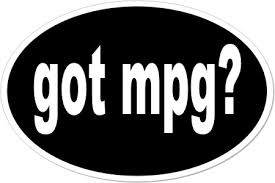Fuel Economy vs. Fool’s Economy
As a Ford dealer, I should be thrilled that President Trump wants to roll back fuel economy requirements for auto manufacturers. He said he is making good on campaign promises to get rid of those pesky regulations that stymie economic growth.
It may be heresy on my part, but I believe easing up on those fuel economy standards will do more harm than good for both consumers and dealers. Also, Trump’s decision could have a devastating impact on the environment.
The Corporate Average Fuel Economy (CAFÉ) standards date back to the 1970s when Americans were still driving gas guzzlers but experienced serious sticker shock at the gas pumps during the OPEC oil embargo in 1976. The standards were meant to help America become less reliant on foreign oil. The Big Three auto manufacturers (Ford, General Motors and Chrysler) also started to feel the competition from foreign competitors, such as Honda, Toyota and Datsun, which brought their fuel efficient vehicles from oversees.
Fast forward to the Obama administration, which increased the CAFÉ goal to an average of 54.5 Miles-Per-Gallon (MPG) by 2025. The fuel economy requirements are based on size and weight of certain models, as well as the types of cars and trucks sold by individual manufacturers.
Over the past 40 plus years those CAFÉ requirements have meant consumers are now driving lighter vehicles, especially designed with better transmissions, power trains and engines to make them more fuel efficient. Ford now has an aluminum pickup truck, which is stronger and safer than the traditional steel truck, and gets up to 26 MPG. Compare that to the single-digit gas mileage in a Ford truck built pre- 1970s. Along with F-Series trucks, the Ford Focus gets up to 37 MPG, while the Fiesta gets 38 MPG and our two hybrids, the Fusion and CMax, get 40 MPG or more.
Indeed, those CAFÉ requirements have led to a whole new vocabulary of vehicles and options—EcoBoost engines, Advance Stop-Start Technology, 10-speed automatic transmissions, hybrids, electric, Tesla—the list goes on and on.
Ah, but the naysayers complain that those advanced features ultimately cost the consumer more and put an unnecessary burden on auto manufacturers. In fact, the Environmental Protection Agency (EPA) estimates it costs an extra $875 to attain that extra fuel efficiency. Auto manufacturers contend the cost is $1,249 per vehicle. In either case, both figures are less than the estimated $1,620 customers are expected to save in gas over the lifetime of their vehicle.
The other question, are CAFÉ requirements job killers or job creators? I’ve got to believe that the engineering and new technologies as well as redesigning plants and equipment have meant more jobs. Ford CEO Mark Fields once estimated the company added thousands of employees, just in its engineering department , to come up with those new designs. More costs to manufacturers? Absolutely, but the last time I looked, the Big Three are doing just fine.
Sunrise Ford has been in business for 85 years. Of course there have been some tough times – depressions, recessions, local booms and busts – but most of that time we have turned a profit. I give Ford Motor Company much of the credit for coming up with innovative and gas saving products that have kept us competitive with other brands.
Finally, what have the CAFÉ requirements done for the environment? The EPA estimates that highway vehicles release 1.7 billion tons of greenhouse gases per year, with each gallon of gas burning 20 pounds of greenhouse gases. A recent New York Times article states that the United States has 4% of the world population but is responsible for 14% of the globe’s man-made greenhouse gases.
Now if you are a Global Warming denier, those statistics won’t mean much to you. However, if you agree with 95% of active climate researchers and the Academies of Scientists from 80 countries who believe man-made global warming is real, then CAFÉ does have an impact. The EPA says that fuel economy has increased 26% from 2004 to 2014. Furthermore, if the average fuel mileage were at 31 MPG, those greenhouse emissions would be decreased by 5%.
I know that all sounds pretty wonky, but those numbers mean less pollution and a more stable climate worldwide. That translates to fewer asthma attacks, allergies and other respiratory diseases. Decreasing greenhouse gases will also help prevent Vibrio Bacteria and algae toxins that are already popping up in our warmer waterways. Curtailing emissions will help to reduce the frequency and intensity of droughts, wildfires and floods that have become more prevalent in recent years.
So, is it worth it to relax these standards – as well as laws that govern coal mining, clean waters and other environmental measures – that have been in effect for decades? I am sure auto manufacturers – and many dealers – are happy about Trump’s decision, but I am not one of them. To me, this is not the time to be pandering to big business. There is just too much at stake.
